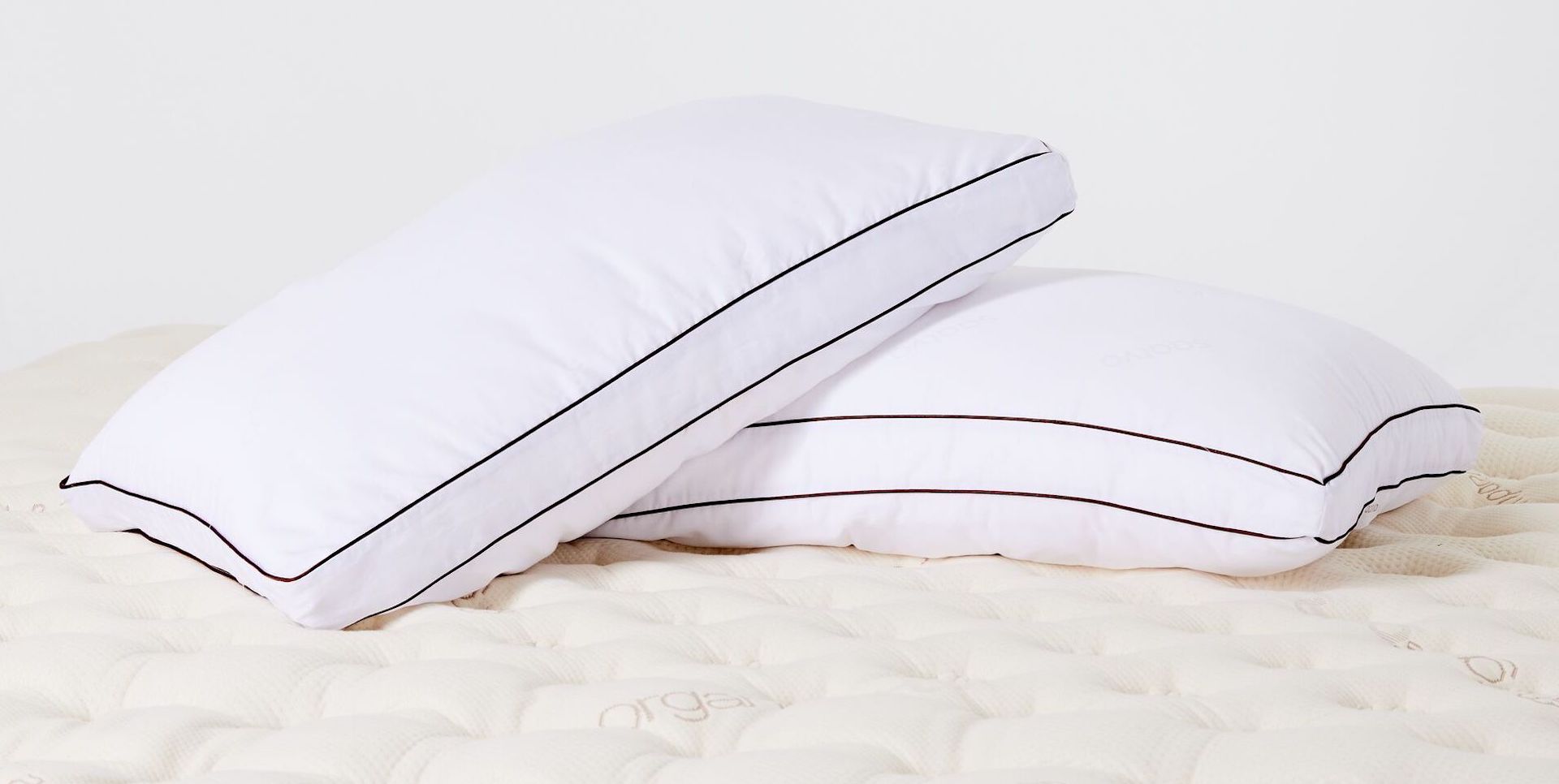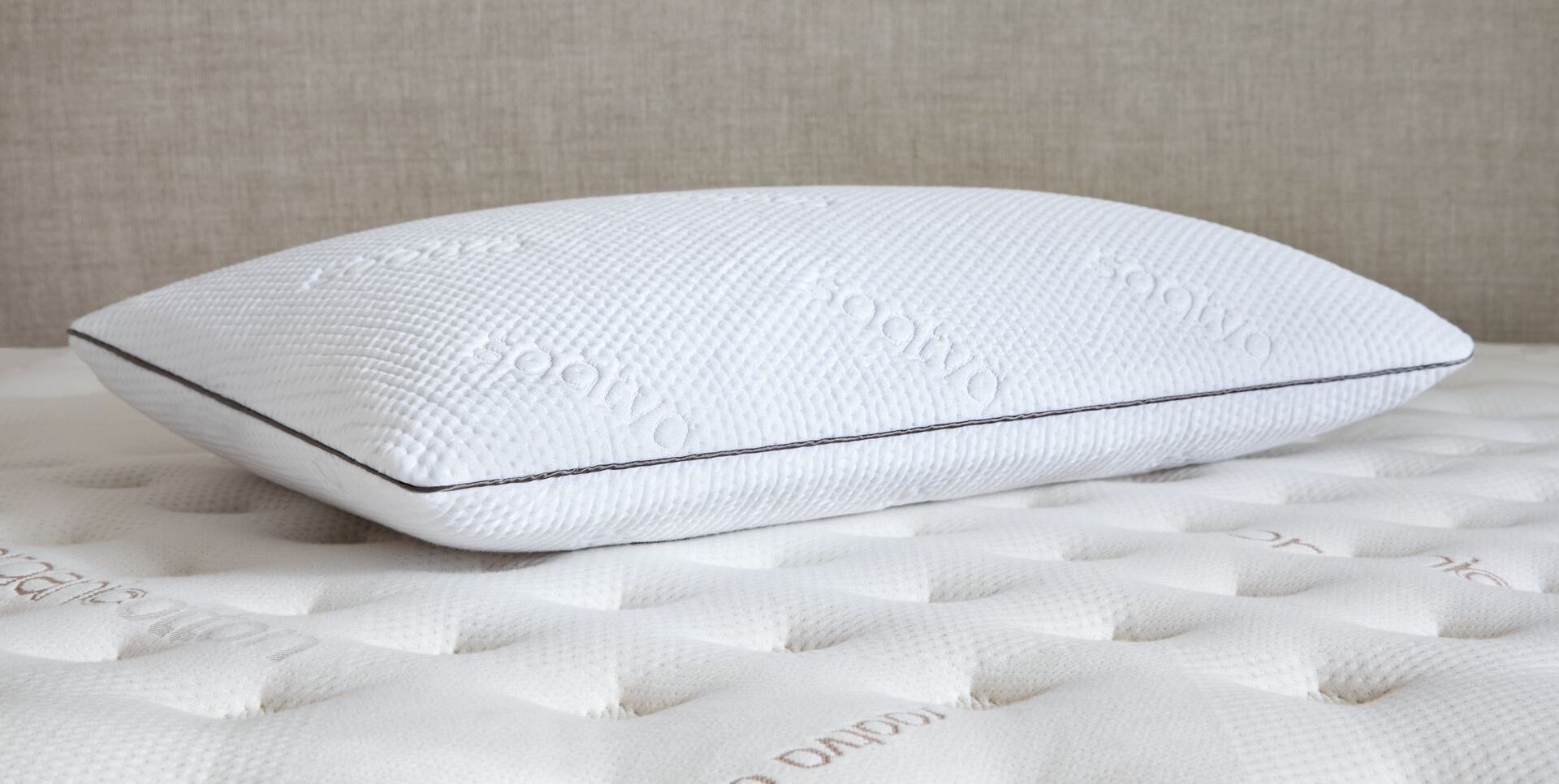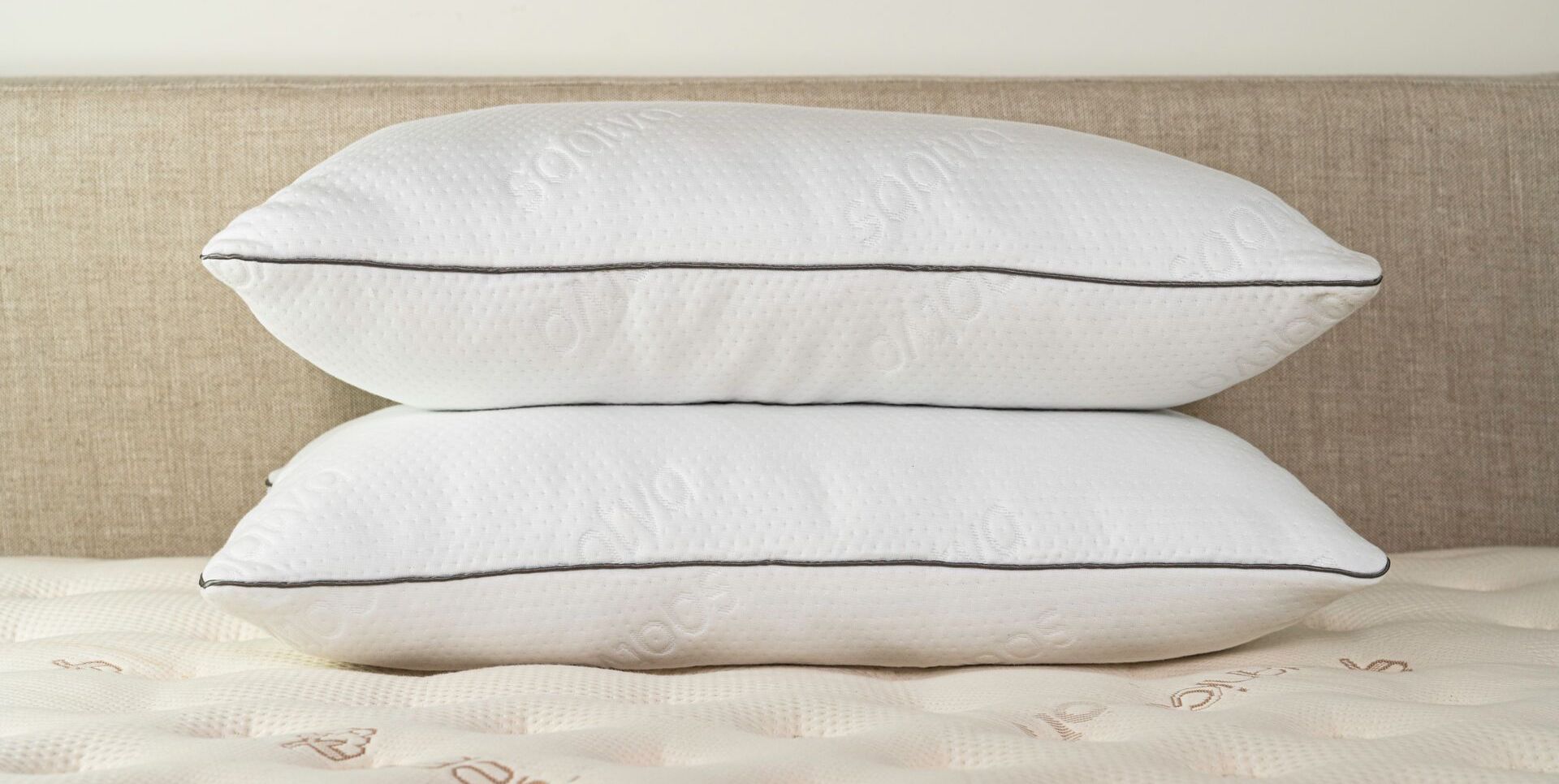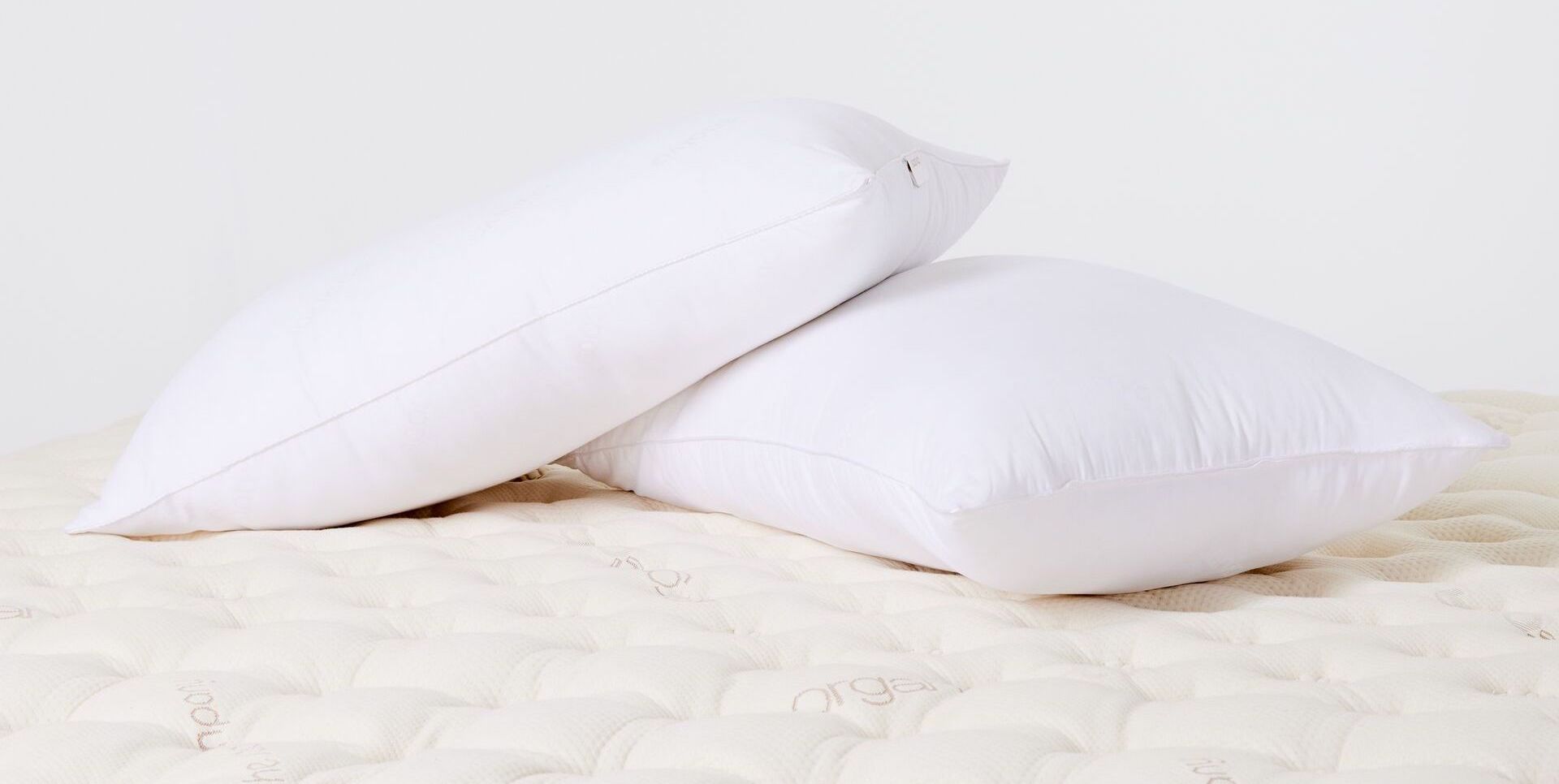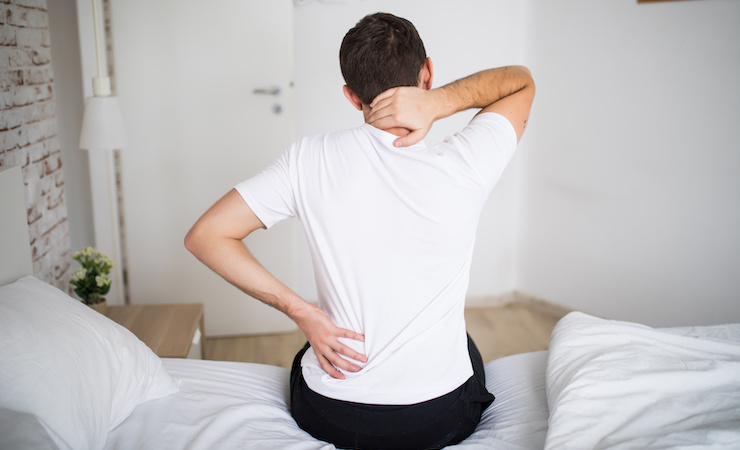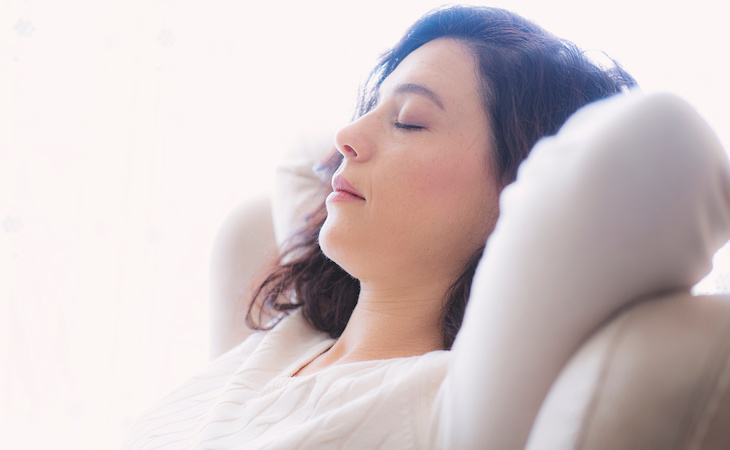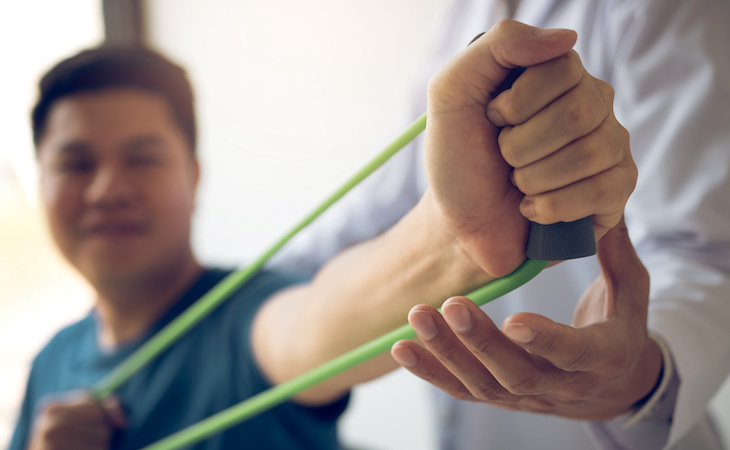After a night of tossing and turning, many of us have been known to wake up with a pain in the neck—literally. Neck pain can be one of the worst feelings to have as you first greet the morning, as it’s a harbinger of discomfort that can follow you throughout the day.
What exactly causes neck pain after sleeping? And is there a stiff neck remedy that will make you feel better in no time? We chatted with Febin Melepura, MD, medical director at Sports and Pain Institute of New York, to answer these questions.
Here are expert-approved strategies for avoiding a stiff neck in the first place, along with tips for sleeping with a stiff neck so you don’t aggravate it further.
Causes of a stiff neck
Before helping you determine which stiff neck remedy is right for you, it’s important to understand why your neck hurts in the first place. Some of the most common causes of a stiff neck include:
- Sleep position: “You may be most likely sleeping in a not-so-favorable position,” says Melepura. “For instance, if you’re a stomach sleeper, you’ll tend to twist your head and neck to the sides. This puts a strain on your neck muscles, causing you to wake up in the morning to a neck that feels sore and stiff.”
- Type of pillow: You may be using a pillow that doesn’t support and cradle your head and neck, “causing pressure to build up in your neck as it tries to compensate for the poor support,” Melepura explains. A pillow that’s too high or too low can also cause your neck muscles to tighten overnight.
- Poor posture: Working too long in front of a computer with a slouching, forward-neck posture puts lots of strain on your neck muscles, something that can cause a stiff neck in the morning. “As a result, you wake up with a painful neck every day until you correct your posture,” Melepura says.
- Arthritis: “Another cause of morning neck pain and stiffness could be a condition called cervical arthritis,” says Melepura. “The narrowing of the space where nerve roots exit the spine pinches the nerves, leading to neck pain, which is worse in the morning.”
- Low-quality sleep: Always have trouble sleeping? Insomnia disrupts muscle relaxation and tissue healing, which can cause you to wake up with a sore neck.
How to get rid of a stiff neck
Now that you know why you’re experiencing a stiff neck, it’s time to take steps to address it. Here are some of the best ways to get rid of a stiff neck:
Apply heat or ice
When waking up with neck pain after sleeping, your first instinct may be to apply heat or ice. As it turns out, alternating heat and ice seems to be the way to go.
“People often face the hot/cold dilemma,” Melepura says. “I usually recommend using cold therapy for the first 24 to 48 hours, especially when your neck pain is acute and/or a direct result of injury. Cold helps constrict your blood vessels, minimize swelling and inflammation, and numbs your sore neck.”
After that, Melepura suggests following with heat application “to loosen your stiff neck muscles and relieve pain.” You can alternate between ice and heat for 20 minutes a few times a day, he adds.
Stretch your neck muscles
Just like you stretch the rest of your body when you have tight muscles, a sore, stiff neck is no exception. Melepura shares the best stretches to help alleviate neck pain:
Neck Flexion And Extension
- Gently bend your head forward by dropping your chin down as much as you can easily tolerate it.
- Hold for 15 to 20 seconds.
- Gradually return to center.
- Extend your neck by tilting your head back and drawing your chin up toward the ceiling.
- Pause for five to 10 seconds and gently bring your neck back to the starting position.
- Aim for at least four to five reps.
Neck Rotation
- Gently turn your head to the left and wait for 20 seconds.
- Slowly bring your head to center, turn it toward your right shoulder, and hold for another 20 seconds.
- Bring it back to the original position.
- Repeat at least two to four times.
Lateral Flexion
- Tilt your head sideways to your right as far as you can do it easily, or such that your right ear is close to your right shoulder.
- Hold for 10 to 15 seconds.
- Slowly bring it back to the original position.
- Repeat the same on the left side.
Levator Scapulae Pocket Stretch
The levator scapulae is the muscle that passes down from the side of your neck to your shoulder blade (scapula).
Here’s how to stretch your levator scapulae on both sides:
- Sit up erect on a chair with your arms resting at your sides.
- Raise the arm of the affected side (i.e., where your neck muscles are most stiff) to grab your shoulder blade on the same side. (If you have difficulty raising your arm, you may skip this step and instead, hold the side of your chair to stabilize your shoulder blade.)
- Move your head a little bit down such that you’re trying to look at your pocket on the side opposite the stabilized scapula. This should give your neck muscles a good stretch.
- Hold for 10 to 30 seconds, or as long as it’s tolerable.
- Repeat the same steps on the other side.
- Aim for at least two to three repetitions.
Massage your neck
Self-massage can also be quite helpful as a stiff neck remedy. “Self-massaging your neck can help relax the knots within the taut muscle bands and provide relief,” Melepura says.
The best way to massage your neck? “Locate the tender points on your neck,” advises Melepura. “Instill a few drops of an oil on your fingertips and rub those tender points with your fingers, gently moving them in circular motions. Go from top to bottom and then from bottom to top of your neck. Do it at least for three to five minutes.”
A naturally-derived oil, such as almond or avocado, is a good option for self-massage.
Take a pain reliever
If all else fails, you can fall back on a pain reliever to lessen your stiff neck pain. “I would recommend taking non-steroidal anti-inflammatory drugs (NSAIDs), such as ibuprofen (Advil, Motrin) or naproxen sodium (Aleve),” says Melepura.
Avoiding a sore neck
There are also steps you can take to avoid a stiff neck in the first place.
For starters, make sure that your computer is set up in a way that’s kind to your posture and your neck. “If you spend a lot of time working in front of your computer, you need to ensure that your workstation is set up in a way that is perfect for your neck,” says Melepura. “The best workstation is one that is placed at your eye level.”
He recommends this experiment to see if your computer is ergonomically correct: Sit down in front of your computer and look at the screen. Your eyes shouldn’t be looking down to gaze at your computer; that puts too much stress and strain on your neck. Instead, your eyes should level with a point about two to three inches below the top of the monitor casing (not the screen). This prevents undue strain on your neck muscles and joints.
Cutting back on the time you spend looking at your phone can also help you avoid a stiff neck, says Melepura.
“When you tip your head forward to look down, it adds pressure that your neck muscles have to bear, giving rise to the ‘text neck syndrome,'” he explains. “This is a condition in which neck pain stems from adopting a static and flexed spinal posture while using your mobile phone for longer periods.”
Sleeping with a stiff neck
There are plenty of things you can do to mitigate a stiff neck while you sleep so you can avoid waking up in pain.
Sleep on your side or back
Melepura highly recommends sleeping on your back or side if you’re dealing with stiff neck pain. “If you’re a stomach sleeper and suffer from neck pain, then you need to train yourself to change your sleep position,” he says.
Choose the right pillow
A good-quality pillow that’s right for you is essential if you’re looking to avoid neck pain after sleeping.
“Finding the right pillow for you is a matter of trial and error,” Melepura says. “The perfect pillow is one that keeps your spine and neck in a neutral, aligned position. That means your pillow should maintain the natural curve of your neck and cradle it properly throughout the night. Your shoulders should not be on the pillow and neither should your head be too high from the rest of your body.” (Here’s how to choose the best pillow for your sleep position.)
Avoid your phone before bedtime
In addition to emitting blue light that can disturb your circadian rhythm, resulting in poor sleep, your phone can also cause sleep-disrupting neck pain. That’s why Melepura stresses “shutting down all electronics well before you hit the sack.”
Prioritize healthy sleep
When it comes down to it, the best way to prevent neck pain after sleeping is simply to get a good night’s rest. That’s because studies have proven that sleep deprivation can lead to chronic neck and back pain.
“There’s a strong link between poor sleep and neck pain,” Melepura echoes. “Hence, practicing good sleep hygiene and prioritizing your sleep is critical to staving off neck pain on waking up.” He shares his top healthy sleep rituals, which include:
- Going to bed and waking up at the same time each day, including weekends
- Giving yourself some time to wind down at the end of a long, tiring day
- Staying physically active
- Avoiding any caffeine close to your bedtime


